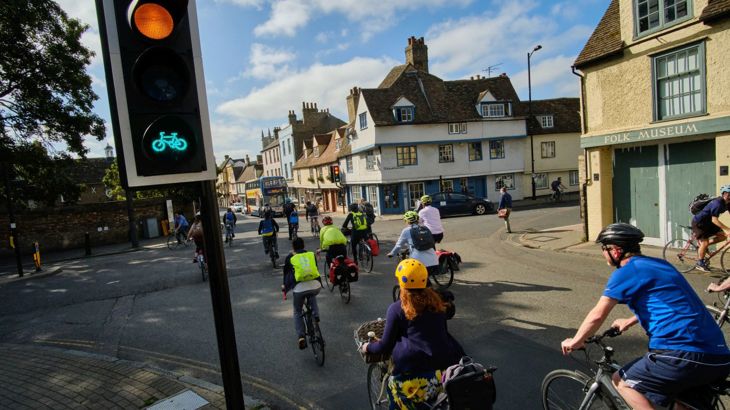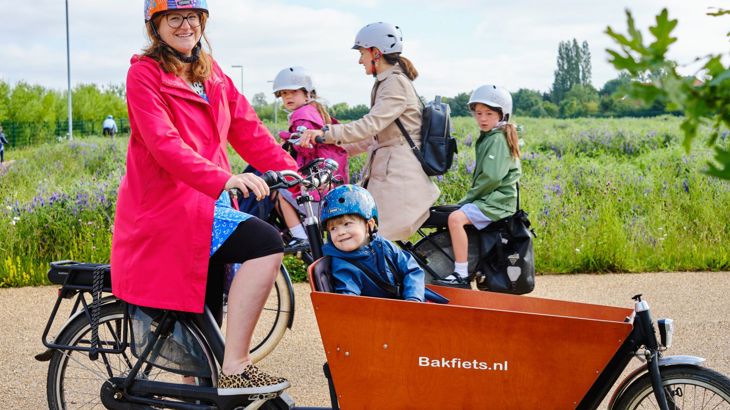Our own independent research of Greater Cambridge residents found that support to make it easier and safer to walk, cycle and use public transport is overwhelmingly positive. But, with motor vehicles being prioritised for nearly 70 years, there's still a need to challenge the status quo. In this blog, Matthew Barber, Head of Partnerships at Sustrans Midlands and East, responds to the Sustainable Travel Zone in Greater Cambridge.

There is overwhelmingly positive support to make it easier for people to walk, wheel, and cycle in Greater Cambridge. Credit: Jon Bewley
In November, 2022 we came out in support of the plans to introduce a Sustainable Travel Zone in Greater Cambridge.
We continue to support the efforts to improve sustainability.
If we want to create healthier places, which allow communities to thrive without having to use a car, then change is required.
Our own independent research of Greater Cambridge residents (Cambridge City and South Cambridgeshire District) found that support to make it easier and safer to walk, cycle and use public transport is overwhelmingly positive.
74% of residents support the building of more physically separated on-road cycle tracks, even when this would mean less room for other road traffic.
66% of residents think that their streets are dominated by moving or parked motor vehicles.
However, we acknowledge that reaching consensus on ambitious change is difficult.
Challenging the status quo
It involves challenging the enduring status quo, which has seen motor vehicles prioritised for close to 70 years.
And it involves balancing complex trade-offs and supporting people along the way.
This is why we encouraged residents to fully participate in the consultation into the proposed Sustainable Travel Zone.
We made our own recommended changes, especially around the offer of additional support for cycling to those on low incomes, and the need for clarity around exemptions, timings, and charging for shift workers, and those on low incomes.
Since the consultation results have been published it has been interesting to see the response.
The level of concern is not unexpected, given the scale of change, and we were pleased to see 70% of respondents supporting the transformation of the bus network.
The support for making improvements to enable more walking and cycling was also clear.
There was a lot to digest in terms of younger and older respondents being far more supportive of the Sustainable Travel Zone, and insightful comments on what changes would be needed to increase support further.

74% of residents support the building of more physically separated on-road cycle tracks, even when this would mean less room for other road traffic. Credit: Jon Bewley
But it’s vital our elected decision-makers do something, if not for us, then for generations to come.
Government research has found young people aged 16-24 years are much less likely to have access to a car and rely on public transport more than all older age groups.
This age-group is also less likely to drive than previous generations and a lack of suitable alternatives to the car is a well-cited barrier for young people accessing education and employment.
This has both immediate and long-term impacts on their economic and health outcomes.
Reducing emissions
In the past year, the conversation on global warming has moved on to one of global boiling, with the impacts of the climate crisis beginning to be felt around the world.
Around one-third of Greater Cambridge’s emissions come from transport.
The changes proposed can at the same time support cleaner air, better public health, and thriving neighbourhoods.
We continue to welcome the region’s efforts to deliver the dramatic emissions reductions needed.
Change might be hard but is desperately needed.
At a time when divisive language, funding cuts, and political point scoring on transport issues is omnipresent, we encourage those in power to reflect on everything that has happened since the ‘Big Conversation’ started, over six years ago, and why Greater Cambridge embarked on this journey to a better future in the first place.
What is clear in Greater Cambridge, is that our elected members are left with that perennial challenge.
The electorate want to see improved public transport, they want improved infrastructure to enable more families to walk and cycle safely.
They want cleaner air, quieter streets, and less congestion. They are even open to making it less convenient to drive.
But they are unsure how or who should pay for this. This is where we need elected members to lead us.
In the future, many will thank them.





